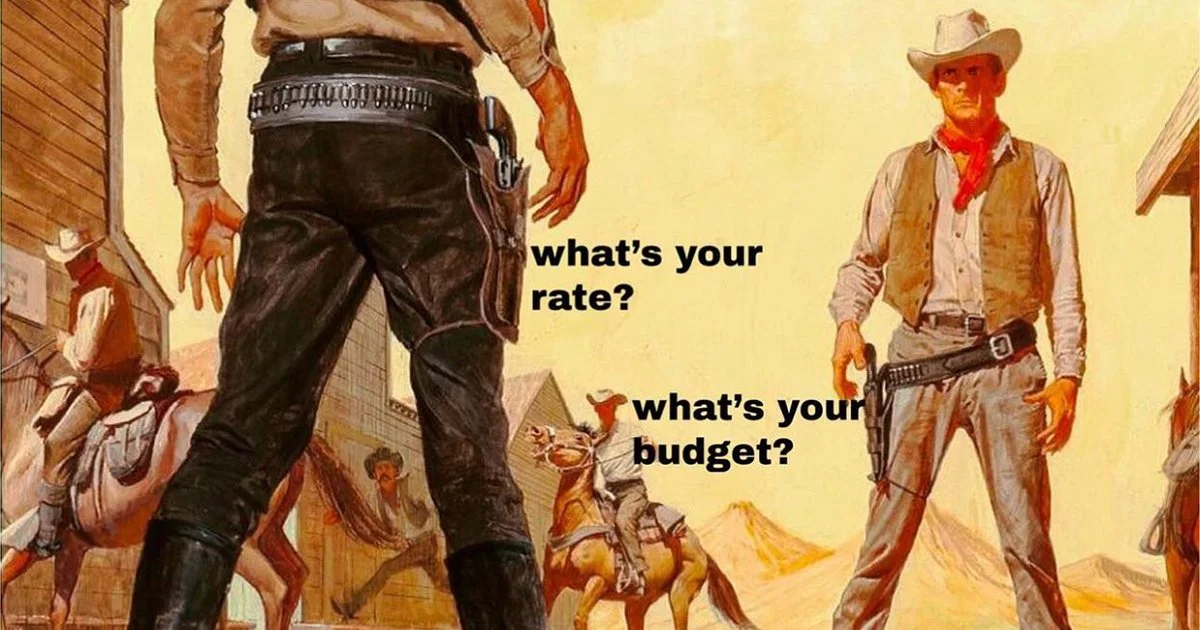Navigating the Budget Conversation: A Roadmap To Mutual Success.
3 minute read…
“What’s Your Budget?”
I am fascinated by this conversation, and apparently some of you are too. The question, “What’s your budget?” often feels like a misstep. Like, you are way out of line buddy. It feels like you are breaking an entry in some cases. It’s a question that, despite its simplicity, can lead to a complex coil of expectations and assumptions. Yet, understanding the dynamics of budget negotiations is crucial for crafting solutions that align with both the client’s vision and the agency’s expertise.
The Complexity of Budget Discussions.
At first, discussing budget seems straightforward. However, I’m learning from talking to some of you that clients often hesitate to disclose their budgets, fearing that might limit the scope of services offered or inflate costs. The reticence sometimes stems from a lack of clarity about what they want or a desire to get the most out of their investment. It’s a dance. A dance of uncertainty where both parties are looking for the best lead.
What if Transparency Levels the Playing Field?
I think that what transparency does in these budget discussions, is it fosters trust and efficiency. It’s akin to sketching the outlines of a masterpiece; only with a clear outline can the artist decide on the shades and intensity of the colours. Similarly, when clients share their budgetary constraints and expectations, it enables studios like ours to tailor our expertise more precisely, offering solutions that are not just viable but vibrant and dynamic.
Tiered Proposals: The Middle Ground?
Perhaps we can meet in the middle with a tiered approach to proposals? Some appreciate bronze, silver, and gold options that define varying levels of engagement and outcomes. This approach not only accommodates budgetary flexibility but also showcases the range of possibilities, allowing clients to make informed decisions based on a spectrum of investment levels. For us, some setbacks with this approach include:
Overwhelming choices: Especially for the clients who are new to the process and may find it difficult to make an informed decision among several options.
Perceived Inequality: Some clients might perceive the lower-tier options as inherently inferior, feeling compelled to choose a higher-priced package even if it exceeds their needs or budget. The problem with tiers is that stripping away costs means removing resource or deliverables, which could leave both parties dissatisfied.
Diluted Focus: I’ve seen this before, where crafting multiple tiered options could dilute the focus from what the client actually needs, leading to a scenario where none of the tiers perfectly fit the client’s specific requirements.
Resource Allocation: From the agency’s perspective, developing and maintaining multiple tiers for each service can be resource-intensive, requiring ongoing adjustments to ensure each tier remains relevant and competitive.
Value Perception: Clients overlooking the value of creative solutions and strategic insights that don’t necessarily scale with cost.
Budget Misalignment: Where clients choose a tier based on price rather than fit, leading to a mismatch between the services provided and the actual needs of the project, potentially requiring costly adjustments down the line (I’ve seen this too).
Cap by Davy Denduyver Offices
In summary, I would argue that holding budgets close to the chest might seem like a strategic move, but often it bypasses the potential for building relationship (which is fundamental for us at Unfound) based on mutual trust and respect. Openness in budget discussions does not just streamline the negotiation process; it cultivates a partnership where both parties are invested in achieving the best possible outcome. In the end, knowing the level of investment a client can make is not just helpful; it’s transformative for both the project and the partnership.


